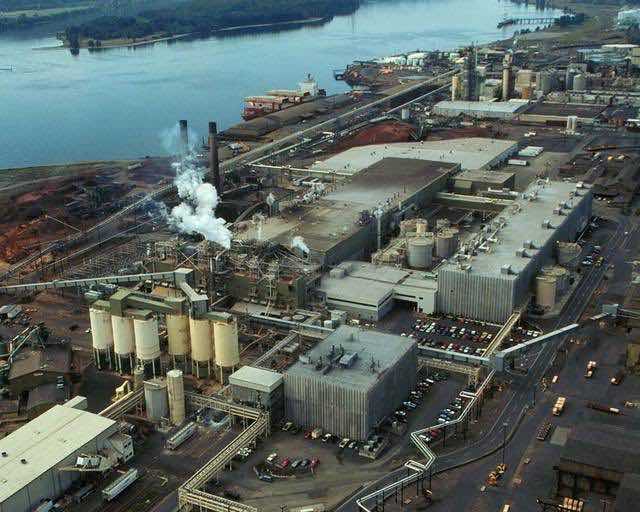the film
forum
library
tutorial
contact
|

|
Columbia Riverkeeper, Weyerhaeuser Company Reach
Agreement to Reduce Columbia River Pollution at Longview Mill
by Staff
Columbia Basin Bulletin, May 12, 2022
|
 Columbia Riverkeeper and Weyerhaeuser Company reached an agreement this week settling Riverkeeper's Clean Water Act lawsuit against the timber giant at its Longview mill. The consent decree must undergo a 45-day review period for the U.S. Department of Justice and then be approved by a federal district court judge before it can go into effect.
Columbia Riverkeeper and Weyerhaeuser Company reached an agreement this week settling Riverkeeper's Clean Water Act lawsuit against the timber giant at its Longview mill. The consent decree must undergo a 45-day review period for the U.S. Department of Justice and then be approved by a federal district court judge before it can go into effect.
As part of the agreement, Weyerhaeuser will need to make numerous improvements to its timber mill facility to reduce the company's industrial pollution.
"People rely on the Columbia for clean water and strong salmon runs. No corporation, including Weyerhaeuser, has the right to flout the law and pollute this irreplaceable river," says Simone Anter, staff attorney at Columbia Riverkeeper. "The requirements of this agreement will see significant steps to reduce pollution at this massive facility."
In the settlement, Weyerhaeuser agreed to make significant changes to reduce the amount of pollution that flows off the 260-acre facility and into the Columbia River. Changes include rerouting a stormwater pipe to flow into a Waste Treatment Plant, instead of the Columbia River. Installation of aerators and particulate screens to reduce the biological oxygen demand and turbidity in discharges and installing flow meters to provide more timely data on stormwater discharges is also required under the agreement.
To make up for past pollution and deter any future violations of the Clean Water Act, the settlement requires Weyerhaeuser to make a payment in lieu of a penalty of $600,000 to the foundation Seeding Justice, which will award grants for projects benefiting water quality in the Columbia River Basin. The company will also be required to pay additional penalties up to $5,000 if certain violations recur in the future.
The Columbia River Basin, an area the size of France, accumulates pollution from industry, wastewater treatment plants, and runoff from agricultural lands, logging, industrial sites, and city streets, says Columbia Riverkeeper.
"As a result, the Columbia River and many tributaries are severely degraded by pollution. Toxic pollution threatens the health of people that eat local fish and jeopardizes the public's right to eat fish caught locally. Rising water temperatures also threaten the health of salmon and other aquatic life that rely on cool water for survival."
Columbia Riverkeeper's staff attorney and Kampmeier & Knutsen PLLC represented Columbia Riverkeeper in the case.
The objective of the Clean Water Act, enacted in 1972, "is to restore and maintain the chemical, physical, and biological integrity of the Nation's waters." The Clean Water Act requires facilities that discharge wastewater into rivers or lakes to have permits limiting pollution. The Clean Water Act also empowers individuals and organizations to enforce those permits and protect the public's right to clean, safe rivers.
Columbia Riverkeeper is a non-profit organization with over 16,000 members.
Weyerhaeuser is one of the world's largest forest and forest products companies. Headquartered in Seattle, Washington, it employs about 9,000 people.
Staff
Columbia Riverkeeper, Weyerhaeuser Company Reach Agreement to Reduce Columbia River Pollution at Longview Mill
Columbia Basin Bulletin, May 12, 2022
See what you can learn
learn more on topics covered in the film
see the video
read the script
learn the songs
discussion forum


 Columbia Riverkeeper and Weyerhaeuser Company reached an
Columbia Riverkeeper and Weyerhaeuser Company reached an 